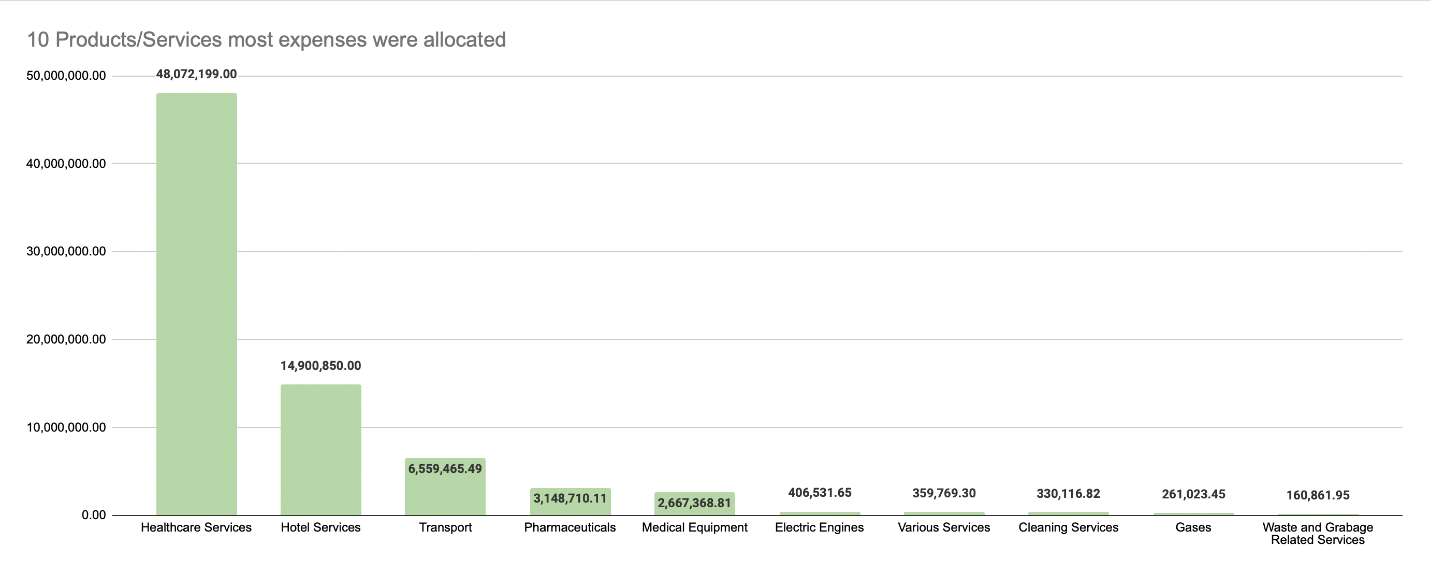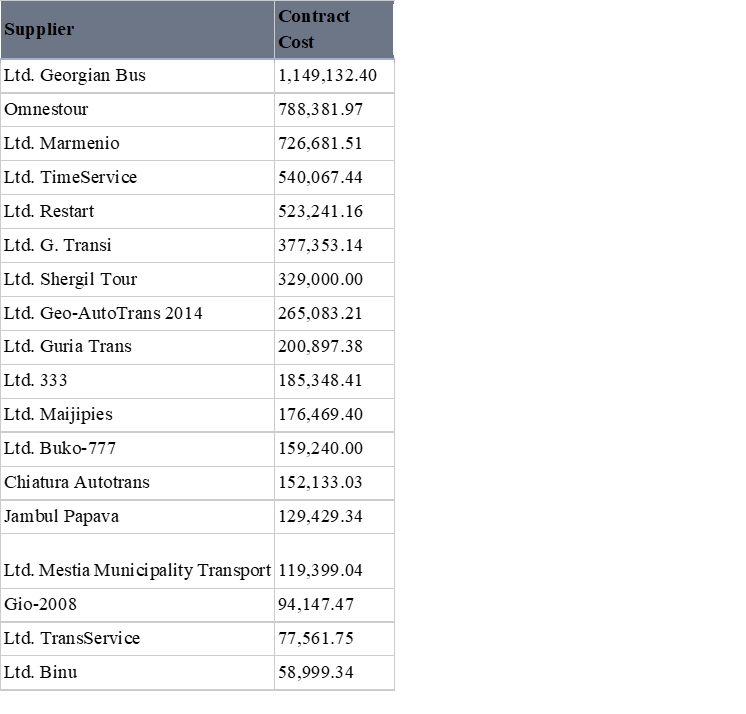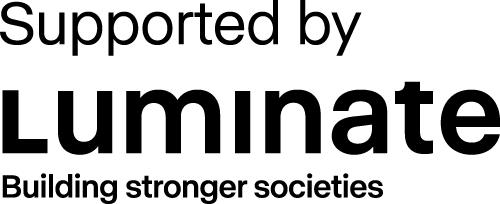
(Initially published on IDFI's website)
Since the beginning of the pandemic in Georgia, the Institute for Development of Freedom of Information (IDFI) has published 4 research papers regarding Covid-19 related public procurements. Research papers covered different periods of 2020 in which various systematic and local problems were identified, including procurement planning, implementation, monitoring, and corruption risks. At this stage, IDFI has analyzed the simplified procurements related to Covid-19 as of May 31, 2021. The study uses both the public procurement requirements presented in the SMP module and the analysis of simplified contracts placed in the CMR module.
Procurement of products or services related to the pandemic tends to be carried out by government agencies during and after the state of emergency, mainly through the use of simplified procurement. The main reason for this was to receive procured products in a short period of time to reduce the risks to the life and health of the population and to prevent the spread of the virus.
Even though it has already been a year since the pandemic, planning procurements in advance and, in most cases, providing electronic tenders remains a problem. Procurement of products and services that have gone through consolidated tenders is, for the most part, at least based on urgency. The reason for such tendency is related to the failure to announce a consolidated tender in advance and, some cases the refusal of the company that won the tender to provide the relevant goods or services. Similar cases are frequent in the case of electronic tenders. These circumstances indicate that both consolidated and electronic tenders cannot be properly planned and implemented, which further requires the use of simplified procurement based on the urgency of the situation.
The electronic state procurement system contains a statement from the Procurement Agency, according to which public procurement of goods and services required for the prevention of Covid-19 can be carried out without tender procedures only in critical and vital cases. In case of ignoring this fact by the procuring entities, the Agency will not issue consent for the implementation of the simplified procurement, and the responsibility will be fully assigned to the procuring entity.
Between February 27, 2020, and April 7, 2021, the State Procurement Agency rejected 53 requests for simplified procurements. Among these, only 19 claims were rejected in 2021, and only one of these was related to Covid-19.
Statistical Data
Coronavirus-related costs during the study period amounted to more than 77 million. Most of these come from healthcare services, which include both the mobilization of beds in clinics and the hiring of medical staff.
Most of the purchases related to the mobilization of beds in clinics come from the National Health Agency, which in 2020 became the legal successor of the Social Services Agency.
In early January 2021, the agency requested direct procurement of 147,706,524 GEL for organizing an event to run smoothly in a limited time. The agency manages a variety of healthcare programs, including ones related to Covid-19. As it is clear from the documents of the request, among the mentioned 148 million GEL, 100 million is intended for the management of the Covid-19 pandemic. Specifically, the Agency was required to conduct procurement of services for Covid-Clinics from January 2021 and no later than March 31, 2021.
Only a few of the contracts uploaded during this period are fixed in the CMR module with the relevant request code, and in most cases, the relevant simplified purchase request cannot be linked. Nevertheless, the analysis of the contracts revealed that the agency has spent up to 48 million GEL to mobilize clinics for Covid-19.
The clinics to which the agency paid more than half a million GEL are given in the following table:

Road Transport Services
As seen in the graph, road transport service is one of the most expensive services. Such an increase in demand can be explained by the restrictions in force across the country, in particular by the ban on public transport for a certain period. This was compounded by the resumption of the educational process in schools and kindergartens while the restriction on transport was still in force. Consequently, the municipalities had to provide transportation for the students to the educational institutions. At the same time, the transportation of affected persons to and from Covid-hotels remained relevant.
In order to transport students to schools and kindergartens, some municipalities joined the "Public School Transportation" program, through which a consolidated tender was announced, with the relevant municipality buying services from the winning companies.
The program was in place before the pandemic and can be used by schools where the student's place of residence is no less than 2 km away from the school, or municipal transport is not moving, or the traffic schedule is not compatible with the lesson schedule. Consequently, some municipalities have used this program before. However, such municipalities also had to purchase student transportation services under urgent circumstances, as in some cases the completion of a consolidated tender did not coincide with the start of school (for example, Marneuli Municipality), and in some cases, the tender did not take place at all (Dedoplistskaro).
Among the 6.4 million GEL spent on transportation services, the largest share was spent on transportation to hotels and back, amounting to more than 1 million GEL. The service was purchased by the National Tourism Administration from Georgian Bus.

Suspicious Circumstances
333 Ltd. received its first simplified procurement agreement in February 2021. A total of 3 simplified procurement agreements have been signed with the company, and in all three cases, the procuring entity was the Ministry of Education, Culture, and Sports of the Autonomous Republic of Adjara. As it is obvious in the rationale for the SMP module, the urgent need for simplified procurement was triggered by unsuccessful consolidated tenders. The company also won 3 consolidated tenders in 2021 (total estimated amounts 578,621.8 GEL), according to which transportation to schools in Khulo, Shuakhevi, and Tsalka was to be provided. Contracts for these services are found neither in the consolidated tender database nor in the simplified procurement database. The company has won a total of 5 tenders since 2018, with a total value of 25,281 GEL. It should be noted that most of these tenders involve construction services, in addition to the other tenders in which the company participated and was not able to win.
The Zugdidi Municipality has procured road transport services from Ltd. MyGPS since January 18, 2021, due to the extension of the educational process in the classrooms. The cost of the contract is more than 176 thousand GEL. One of the shareholders of the company, Temuri Matua, donated 60,000 GEL to the ruling party on September 15, 2020.
In February 2021, funds were allocated from the Contingency Fund of the Poti Municipality for the accommodation of mobilized medical personnel at the Rukhi Hospital. A simplified procurement contract worth 16,500 GEL was signed with Nani Targamadze. For the same purpose, from December 2020 to February 2021, the Zugdidi Municipality signed 3 simplified procurement contracts with a total value of 33,850 GEL with Targamadze. Until 2020, this individual had no activity in public procurement. Targamadze's spouse, Nugzar Malashkhia, is the director of the NNLE Zugdidi Cleaning Center in the Zugdidi Municipality. According to Malashkhia's declaration, his wife owns the Golden Fleece Hotel on Kostava Street in Zugdidi.
In May 2021, Batumi Republican Clinical Hospital Ltd. purchased a pharmaceutical product worth 1,860 GEL as a matter of urgent need. A simplified procurement agreement was signed with Vitapharm Plus Ltd.. The company has three shareholders, and all three of them also own a stake in Vitapharm Ltd., one of the shareholders of which is a former member of the Supreme Council of the Autonomous Republic of Adjara from the Georgian Dream Party (inclusive 2020) and former Minister of Health of the Republic of Adjara (inclusive 2016), Nugzar Surmanidze. Surmanidze was the chairman of the Health and Social Affairs Commission in the Supreme Council. According to the latest declaration and the extract from the public register, he has entrusted the right to manage the shares to his wife, even though he remains a shareholder. The trust document was signed in October 2017, and in February of the same year, the local opposition accused Surmanidze of lobbying his own company for public procurement and alleged corrupt deals. In 2014-2020, between the appointment of Surmanidze as the Minister of Health and including the period of membership in the Supreme Council, Vitapharm Ltd. received simplified procurement contracts of 122,038.44 GEL, of which 81,872 GEL was just in 2020. In 2021, a simplified procurement contract of up to 12,000 GEL was signed. In 2014-2020, the company received 2,128,029 GEL through electronic tenders.
As for Vitapharma Plus Ltd., the company was founded by Surmanidze's three business partners in 2015 and since then has received simplified procurement agreements worth 101,600 GEL through 2020. Of this amount, 95,430 GEL was between May and November of 2020. In 2021, a simplified procurement contract of up to 5,000 GEL was signed.
In 2016-2020, the company has participated in a total of 15 e-tenders and won 14 of them without competition and 1 - under one competitor. It should be noted that in 7 cases in the mentioned tenders, the buyer was the Batumi Medical Aid Center, with the total estimated cost of the procurement at 4,757 GEL. In the remaining 7 cases, the procuring entity was Batumi Republican Clinical Hospital Ltd., 100% of which is owned by the Autonomous Republic of Adjara, and the share manager is the Ministry of Health and Social Affairs of the Autonomous Republic of Adjara. The total estimated cost of the procurement is 471,281 GEL. In 3 tenders with the estimated value of 121,361 GEL of the same buyer, "Vitapharm Plus" won again in 2021 without competition.
On May 10, 2021, Academician Nikoloz Kipshidze Central University Clinic requested the right to make a simplified procurement of 69,130 Euros for COVID-19 infected patients in order to acquire an additional bed and provide the necessary qualified medical services in a short period. The necessity of carrying out the procurement in a simplified manner was substantiated by the amendments made to the Resolution N674 of the Government of Georgia dated 31.12.2020 by the Resolution N736 of 04.12.2020, according to which the Acad. Nikoloz Kipshidze Central University Clinic was tasked with repairing and equipping 2-2 wings of the 4th, 5th, 6th, and 7th floors above ground of the building №2 (Plot - 07/081) located at №29 (Plot 07/081) on Vazha-Pshavela Avenue in Tbilisi Cadastral Code: №01.10 .15.007.081)). After obtaining the approval of the State Procurement Agency, the clinic signed two agreements with Hospimed Georgia Ltd. and Diamed LLC. The total cost of both purchases ended up at over 54,000 GEL.
The founders of Diamed Ltd. are Lela Beglarashvili and Giorgi Managadze. Managadze is a donor to the Georgian Dream, having donated 60,000 GEL to the party in 2017. Until March 2021, the company had a third shareholder - Liana Chumburidze, who held the position of Deputy Mayor of Chiatura from May to December 2018. According to Chumburidze's declaration, it turns out that from January to May 2018 she was the financial director of the Central University Clinic named after Academician Nikoloz Kipshidze Ltd. The agreements in the electronic procurement system show that she held this position in 2017 as well. In 2020, when Chumburidze was no longer working in the clinic, although she was still a shareholder of Diamed, the Central University Clinic signed 3 simplified procurement contracts with Diamed Ltd. with a total value of up to 420,000 GEL.
The director of Diamed Ltd. is Denis Didenko, who is also a shareholder and director of Hospismed Georgia Ltd. Hospismed Georgia Ltd. is also actively accepting simplified procurement contracts related to Covid-19, most of which come from Academician Nikoloz Kipshidze Central University Clinic. Interestingly, before the pandemic, while working at Chumburidze University Clinic, when Didenko was also the director of Chumburidze's Diamedi company, Didenko's Hospismed Georgia LLC won tenders announced at the University Clinic. Moreover, Liana Chumburidze, as a financial manager, was a member of the tender commission and signed the documents announcing Didenko's company as the winner. For instance, according to this agreement, a contract worth 70,000 GEL was signed with Didenko's company.
Based on the document below, a contract worth 109,000 GEL was signed with Didenko.
On April 1, 2021, the Central University Clinic named after Academician Nikoloz Kipshidze signed a simplified procurement agreement with KP Group Ltd. for the purchase of medical equipment. The value of the contract was 159,500 Euros, which was 645,000 GEL in the national currency at the exchange rate on the day the contract was signed. The device was designed to create extra bed space in the clinic. The shareholders of KPI Group Ltd. are Andro Dzneladze (50%) and Ilia Giorgobiani (50%). The company received its first simplified procurement contract in June 2020, having had no previous experience in conducting state tenders. So far, 4 simplified procurement contracts worth up to 868,000 GEL have been signed with the company, out of which, in the case of 3 contracts worth up to 700,000 GEL, the buyer is the University Clinic.
Another company whose shareholder is Andro Dzneladze is KP Surgery Ltd. The company received 2 simplified procurement contracts from the Central University Clinic for identical purposes, with a total value of EUR 296,000. According to the acceptance-delivery acts, the total amount paid in the national currency amounted to GEL 1,126,000.
Andro Dzneladze owns shares in other companies, including Pineo Medical Ecosystem Ltd., where his partner is Avtandil Imedadze. Imedadze was the director of the Academician Nikoloz Kipshidze Central University Clinic Ltd. until 2019.
Although Academician Nikoloz Kipshidze Central University Clinic is a limited liability company through its organization, generates revenue and may not be held to as high a standard as the organizations funded from the budget, it is nevertheless important to note that the clinic is 100% state-owned. It is managed by NNLE Georgia Medical Holding and, most importantly, the clinic receives funding from the state budget for the fight against coronavirus, including for the creation of additional bed spaces, and is accountable in part to the Ministry of Health. Consequently, the questionable procurements cited in the study are funded from the state budget. In addition, the clinic is authorized by a government decree to use the funds allocated to them through simplified procurement. The fact that direct purchase agreements are concluded with the companies of the former senior officials of the Clinic raises the suspicion that these contracts may have been agreed in advance and the budget funds allocated for the fight against coronavirus may be disposed of through the clinic's internal contacts, thus containing signs of a corrupt deal. It is desirable that state-owned companies, especially medical institutions, in which high trust is in the public interest, conduct themselves with a high degree of transparency not only in the management of state funds but also in the management of non-budget funds and guarantee a competitive environment in procurement, allowing clinics to serve the public with more quality products for a lesser price.
As for the Batumi Republican Hospital, the procurement covered by the study did not include the amount of the budget. However, the hospital receives funding from the state budget for the management of Covid. Therefore, it is important to eliminate such cases so that there are no doubts about the management of state funds.
Conclusion
In the example of procurements of the LEPL National Health Agency, the difficulty of monitoring procurement related to Covid-19 is obvious. The agency manages various areas of healthcare, and the simplified procurement requirements placed in the system apply to all components. In the contract module, it is not possible to identify under which component a purchase was made. This can be determined only by accessing the text of each contract.
As IDFI has noted in previous studies, in terms of monitoring and evaluation, it is important for the connection between the requirement of simplified procurement and the signed contracts to be as clear as possible. The field where the purchaser must indicate the relevant request code while uploading a contract is not sufficient for this, as this field is often disregarded by the purchaser.
Additionally, as the case under consideration has shown, it is often possible to combine simplified procurement requirements for the services of different components, and after obtaining approval, it becomes impossible to identify the component in the contract module until the contract is studied. Given that the system does not yet have a built-in Covid module or a separate procurement function for this purpose, such an approach further complicates the monitoring process.
It is advisable to fill in the SMP code field on the page of CMR agreements concluded in agreement with the agency, with the addition of a search with the appropriate SMP code in the filter function in the CMR module, which will make it much easier to determine the need for a simplified procurement in each case.
The questionable circumstances found in the simplified procurements carried out by several state-owned coronavirus clinics raise questions about the use of personal or business connections in the contracting process. Although public clinics operate mostly on their revenue, they need to adhere to the principles of integrity and competition in public procurements. However, it should be noted that state clinics involved in the management of coronavirus are funded directly from the budget.
___

The research was prepared within the grant for Good Governance for Georgia project from the global philanthropic organization, Luminate. The Institute for Development of Freedom of Information (IDFI) is responsible for the content of this document. Views expressed in therein do not reflect the position of Luminate.